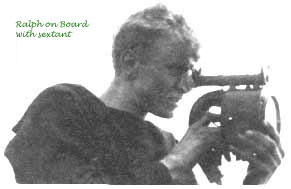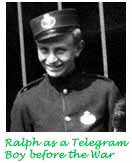

|
|||||
| Ralph Stobart Robson, signalman, life in the British Royal Navy World War Two, sinking of Prince of Wales and the Repulse, Singapore | |||||
|
|||||
|
|||||
|
There was no guard on the RAF camp. We found a sergeant who told us that we could be looked after and would be given an evening meal and accommodation for the night. God bless the RAF! It was at this stage that I temporarily parted company with the navy. Next morning when we had breakfast, we were told that there was to be a general gathering of the forces. Navy, army and RAF personnel gathered into groups, but there was just a handful of sailors. Presently the man in charge of the naval personnel arrived. He was a Petty Officer Telegraphist whom I vaguely remembered from my time on the Prince of Wales. What I heard of him did not impress me. First of all he wanted us to fall in. That cut no ice. Then he said that he had jobs for us. This announcement was greeted with stony silence. Then I spoke up. I told him how we had been abandoned. He said that it had been an accident, to which I replied, "Bollocks! I'm going to look after myself. If any of you lads want to come with me, now is your last chance." The two signalmen who had arrived with me made a move and before the petty officer had got his breath we were over the hilltop and down the Bukit Timah hill. Nobody followed. When we reached the crossroads at the bottom of the hill we paused for breath and had a discussion. We decided that our primary objective was the Singapore docks. We had only the clothes we stood up in. I was dressed in a white sailor's hat, vest, underpants, khaki shorts, a light blue sailor's shirt, socks and black shoes. These were my only possessions apart from my sailor's paybook from the Prince of Wales and a little money. The other two were virtually the same except that they wore sailor suits. The further we got into Singapore, the worse the damage became. Everywhere was evidence of heavy bombing. The people we met, mainly Malayans, Chinese and Indians, looked harassed and worn. The few Europeans we encountered were mostly in cars. The widespread damage to houses, shops and trees became more severe as we approached the docks. At last we came to the quay which was jammed with every kind of vehicle and a seething mass of people. The congestion stretched in both directions from the dock gates. Finally we managed to reach the gates and saw the reason for the queues. A few ocean-going liners were lying alongside the wharf. I afterwards identified two of them as the U.S.S. West Point, formerly the SS United States, the last winner of the Atlantic Blue Riband, and I think the other one was the Duchess of Bedford, a transport run by the RAF. The West Point looked huge. I said, "I don't think we will have too much trouble. The biggest problem will be to get on board." We stood well back in the crowd. On the way in I had noticed a naval 30 cwt. truck further back in the queue. "Come on," I said, "let's see what we can find back along the road." We soon found the truck but continued walking as if we had no interest in it. We then doubled back and looked into the rear. Our luck was in! Behind the driving cab was a great, loosely draped tarpaulin. We climbed in. Nobody took any notice, so we settled down under the tarpaulin to wait. In fits and starts the truck gradually moved forward. After what seemed an interminable length of time we reached the dock gates. There were voices and we heard footsteps approaching the truck. We held our breath. Someone must have looked inside the truck in a cursory fashion, but after only a short wait the vehicle moved off. A thankful sigh was heaved and presently the truck was driven on into what turned out to be a godown. This was one of a series of covered sheds alongside the dock. After the driver's footsteps had retreated, we took a quick look out. Right in front of us was the West Point, but how were we to get on board? Immediately ahead of us in the ship's side, apparently for the crew's use, was a small gangway and sentry. He appeared to be in earnest conversation with someone on the ship. Turning to my companions I said, "Walk with me to the gangway and wait at the bottom." Off we strode, trying to look confident. Leaving the others at the bottom, I walked up the gangway. As I approached, the sentry turned. "I've got instructions from the Naval Base to join this ship," I lied. "Apparently you need someone who can read British Signals. Who do I see?" The sentry told me that I needed to be on the bridge. I asked him how to get there and was given detailed instructions, which were received with many thanks. I waved to the other two and they joined me. We were on board! Sweating profusely, we set off towards the next hurdle, the bridge. After losing ourselves a few times, we arrived at the bridge companionway. I wet my lips and muttering "In for a penny, in for a pound," I climbed onto the bridge. There was an officer and a sailor on watch. Approaching the officer I gave my little speech, to which he responded, "Say, what a great idea! Hey bud, take these guys to the skipper." So, accompanied by the sailor we trooped off to a luxurious cabin where we presented ourselves to the captain. After we had explained our mission, the captain accepted our presence without question and we were told we were free until the ship sailed. I was very nearly collapsing with the strain. The other two had not said one word. Once we were alone we shook hands and danced around with joy. As we wandered away from the captain's cabin, I suddenly realised how hungry I was. We had had nothing to eat since breakfast at seven o'clock and it was now two in the afternoon. We explored the ship until we found ourselves in a huge galley. Cautiously we approached a cook and asked if we could have something to eat. "Sure you can," was the prompt reply. "Would chicken do?" We were amazed. Chicken was a luxury that we had never been offered before. Ten minutes later we were given half a chicken each and a variety of vegetables. This was followed by a five pound tin of Californian figs accompanied by the chef's apologies. He was sorry but that was all he had at the moment. The figs were magnificent, a gift from the country which had only just entered the war. Although the ship was lying alongside for some time, very little was happening. This vessel could accommodate all the people on the dock but the wheels of bureaucracy were grinding very slowly. Desperately anxious would-be passengers were filing past the entry point at a snail's pace. Each passport was being carefully scrutinised by English customs officers. Sometimes it took five or ten minutes to deal with one family. All the native people were refused entry to the ship. These were amahs, women who had looked after white people's children. There were native Malays, Chinese and Indians amongst them. For long periods only one entry point was open. It seemed to be a complete shambles. Next day I was on the aft docking bridge when the captain and an officer paused on the bridge below. I could hear the captain clearly. He was commenting bitterly on the actions of the customs and dockyard officials as he passed underneath where I was standing. "Why the hell couldn't they let all those people on board without them producing their passports?" he growled. "And why couldn't they have let those Chinese and amahs on board? I could have taken everybody who was on the quay!" He continued to rant along these lines until suddenly he stopped. "Who does that belong to?" he demanded. On the deck was a huge Mid West Corporation of America radiogram. The officer sheepishly replied that it was the property of one of the passengers. "Throw the bastard overboard!" roared the captain. "If I can't carry people, I won't carry a damned gramophone!" Later that morning we left the wharf. A great number of people had been left behind. Native servants who had been with the same family for years were refused permission to leave with their master and mistress. Amahs were in tears as their young charges sailed away without them. Very often their mistresses too were distressed. So we left Keppel Harbour on the way to Batavia. The Duchess of Bedford was left behind. She had received a bomb through one of the open hatches, but although the hold was flooded she eventually arrived at a safe port. During the voyage I kept watch in a most peculiar place near the forward funnel. The ship had two funnels, the aftermost of which carried away the smoke from the engines. The forward funnel was the lookout point, which was manned by an officer and two ratings who we separately joined as part of the watch, with four hours on and eight hours off. A ladder was ascended through a tunnel in the foreside of the funnel and watch was kept in a little gallery. Even when I wasn't on watch, I preferred to remain on deck. My experience on the Repulse had left me nervous of attack. If the ship were hit I would rather be free to jump overboard than be trapped below. All three of us chose to sleep on deck each night. The West Point ploughed on, steaming through the islands until we eventually arrived off Batavia, now called Jakarta, and dropped anchor. During the entire voyage no Japanese were sighted. I had heard through an obscure source that a good friend of mine, a Lancastrian called Ginger Lunt, was at Batavia. I knew no way of getting in touch with him. He was a British rating who helped to man the Dutch signal station on shore, and when I tentatively asked if I could communicate with him the Officer of the Watch enthusiastically agreed. Since this was the first signal I had sent since boarding the West Point, the procedure was observed with great interest. I soon got in touch with the signal station and learned that Ginger was on watch. I decided to try to see him, as the West Point was to remain there for three hours. The hawse pipe to the anchor chain was open and I climbed down to where a number of bumboats were clustered. The chain had huge links and I had no difficulty scrambling down. After negotiating a price with the boatman I was soon ensconced in the bumboat. The signal station was at the end of a long pier. I climbed up the ladder and there was Ginger, wreathed in smiles. We gleefully shook hands then the Yeoman kindly excused us and we had a long chat. After catching up on each other's lives I returned to the ship and shortly afterwards we resumed the voyage, sailing through the Java Straits and terminating in Colombo. We sailed past the sight where a volcano had erupted in the late 19th century. All that was left was the spike of a little island standing clear of the water. This explosion had affected the atmosphere of the earth for about four or five years afterwards. |
|||||
|
|||||
